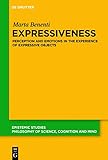Expressiveness : Perception and Emotions in the Experience of Expressive Objects / Marta Benenti.
Material type: TextSeries: Epistemic Studies : Philosophy of Science, Cognition and Mind ; 45Publisher: Berlin ; Boston : De Gruyter, [2020]Copyright date: ©2020Description: 1 online resource (VIII, 190 p.)Content type:
TextSeries: Epistemic Studies : Philosophy of Science, Cognition and Mind ; 45Publisher: Berlin ; Boston : De Gruyter, [2020]Copyright date: ©2020Description: 1 online resource (VIII, 190 p.)Content type: - 9783110669565
- 9783110670141
- 9783110670011
- 128.3 23
- B105.E95 B46 2020
- online - DeGruyter
- Issued also in print.
| Item type | Current library | Call number | URL | Status | Notes | Barcode | |
|---|---|---|---|---|---|---|---|
 eBook
eBook
|
Biblioteca "Angelicum" Pont. Univ. S.Tommaso d'Aquino Nuvola online | online - DeGruyter (Browse shelf(Opens below)) | Online access | Not for loan (Accesso limitato) | Accesso per gli utenti autorizzati / Access for authorized users | (dgr)9783110670011 |
Browsing Biblioteca "Angelicum" Pont. Univ. S.Tommaso d'Aquino shelves, Shelving location: Nuvola online Close shelf browser (Hides shelf browser)
Frontmatter -- Acknowledgments -- Contents -- Introduction -- Chapter 1. Theories of Expressiveness: Some Desiderata and an Overview -- Chapter 2. The Phenomenology of Expressive Experience -- Chapter 3. The Content of Expressive Experience -- Chapter 4. Metaphors and Resemblances -- Chapter 5. Secondary Meaning and Core Affect -- Conclusions -- References -- Index
restricted access online access with authorization star
http://purl.org/coar/access_right/c_16ec
A natural landscape can look serene, a shade of colour cheerful and a piece of music might sound heartrending. Why do we ascribe affective qualities to objects that can't entertain psychological states? The capacity that objects, and especially artworks, have to express affective states is a bizarre phenomenon that needs to be clarified in numerous respects. Philosophers are still struggling with the phenomenon of expressiveness being a matter of imagination, perception, or mnemonic association, and usually do not agree on the role that emotions and human bodily expressions play in it. Benenti questions the main theories that populate the aesthetics domain using the tools of philosophy of mind. This study deals with crucial debates concerning seeing-in, cognitive penetration, the relation between phenomenal character and representational content and between emotions and expressions. It aims at providing a viable account of the experience we have of expressive properties by casting light on its fundamentally perceptual nature. The outcome is an empirically informed and critical overview of a topic which has been rather neglected in the philosophy of mind. The book will be of interest to scholars of the philosophy of mind, aesthetics, the cognitive sciences, and psychology.
Issued also in print.
Mode of access: Internet via World Wide Web.
In English.
Description based on online resource; title from PDF title page (publisher's Web site, viewed 28. Feb 2023)









